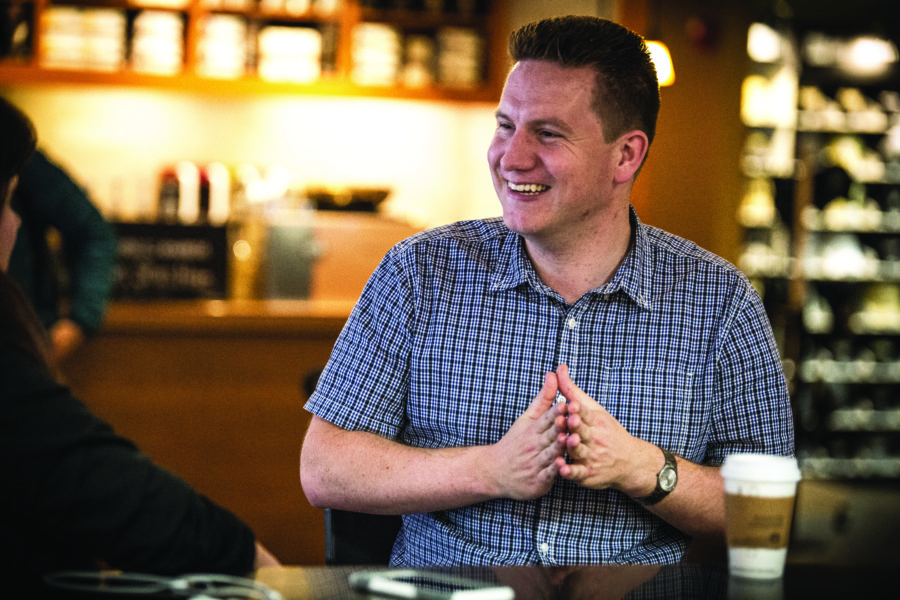Case studies regularly happen throughout University of Idaho campus research facilities. A frequent issue for faculty researchers is funds needed to test their hypothesis. UI Seed Grant Funding, announced they will launch 13 faculty members” research projects.
Each distributed grant will be between $10,000 to $12,000 for 13 faculty applicants. These research projects will range from examining extremist groups on social media to developing a new class of sugar-connected compounds of gyclosides.

Nicholas Eastman-Pratt | Argonaut
Anne Laarman, Assistant Professor of Ruminant Nutrition & Metabolism at the University of Idaho, is the recent recipient of the Seed Funding Grant.
Steven Radil, an assistant professor of department of geography, said he is developing a new dataset on violent extremist orgranizations that are driving conflict around the world.
“My training is in geography which literally means “writing about the world” and war is a big part of the story of the world today,” Radil said.
He said his strategy is to use a social map of data to evaluate extremist groups” spheres of influence, and identify their enemies and allies.
While some of these grants are contributed to evaluating social behaviors, professors such as Kistopher Waynant, a clinicial professor of chemistry, studies details on the molecular level. He said his project will be evaluating a series of new glycosides.
“Glyco” means sugar or carbohydrate, and the most common sugar is glucose which is found in plants and mammals. He said one of his modifications is to switch an oxygen atom with a carbon atom on a molecular target. This modidfication might help sugar molecules more easily absorbed in the blood stream.
“As people are different,” Waynant said. “We will be able to synthesize a wide variety of compounds for testing simply on the manipulation of the sugar portion which we think may lead to personalized medicine.”
Another Seed Grant project is in agriculture. Cows, sheep and goats will be examined by a natural fiber fermentation product known as butyrate. This acid base has three main characteristics: as an energy source, acid, and a genome modulator that affects the gene expression directly.
Anne Laarman, assistant professor in the department of animal and veterinary Science, said he will inspect a calf”s rumen, part of the digestive system, in one of the earliest stages of life.
“This particular grant is looking to use the rumen to do some research on cell division,” Laarman said. “The rumen, like the colon, is a natural fermentation chamber, and has the advantage that it”s before the stomach so we have a lot more nutritional control over how we study cell division.”
He said this research will have two benefits. First, it is beneficial in terms of further understanding human health in cancer. It is also the direct value in the agricultural industry.
As case study”s are filtered by the media, some are published on thought-provoking topics. Dilshani Sarathchandra, Assistant Professor of Sociology, Dilshani Sarathchandra will have future survey respondents read about scientific articles that have been retracted from the public literature.
“My particular study is looking at retractions in science “¦ and seeing if reading about retractions in the news media reduces people”s trust in science,” Sarathchandra said. “Most people tend to base their opinions about science on what they care about. So, for instance, people who care a lot about climate change “¦ their political orientations come into play.”
She said that out of the total percentage of scientific publications removed, 55 percent are because of falsififying data or plagarism, and 30 percent is due to minor sceintific mistake. Sarathchandra said this is not neccessarily due to scientists being increasingly dishonest, but because the systems have become better at detecting fraud, such as software that detects plagarism and inconsistencies.
“Scientists are human,” she said. “Science, by its nature, includes uncertainty. When scientists aren”t able to give black or white answers … that leads to more problems in whether people trust science or not.”
Seed Grant supports early faculty career advancement and establishes research agendas that may help them voice their ideas.
“As a geographer, I could study nearly anything,” Radil said. “But I have chosen this because of my children who have not lived a single day on Earth as a citizen of a country at peace. Perhaps I can make a small contribution to a different kind of world for them. That seems like a worthwhile way to spend my time.”
Catherine Keenan can be reached